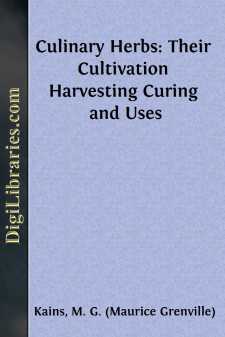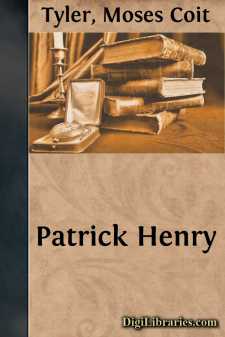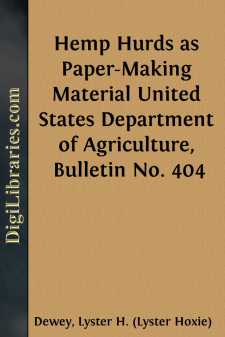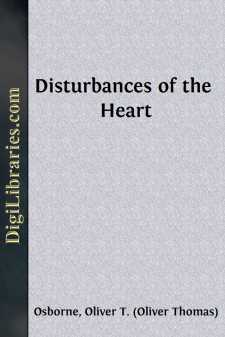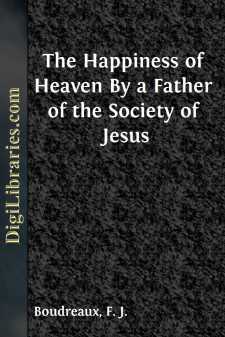Non-Classifiable
- Non-Classifiable 1768
Non-Classifiable Books
Sort by:
PREFACE A small boy who wanted to make a good impression once took his little sweetheart to an ice cream parlor. After he had vainly searched the list of edibles for something within his means, he whispered to the waiter, "Say, Mister, what you got that looks tony an' tastes nice for nineteen cents?" This is precisely the predicament in which many thousand people are today. Like the boy,...
more...
by:
Thomas Carlyle
LECTURES ON HEROES. LECTURE I. THE HERO AS DIVINITY. ODIN. PAGANISM: SCANDINAVIAN MYTHOLOGY. [May 5, 1840.] We have undertaken to discourse here for a little on Great Men, their manner of appearance in our world's business, how they have shaped themselves in the world's history, what ideas men formed of them, what work they did;—on Heroes, namely, and on their reception and performance;...
more...
by:
Moses Coit Tyler
PREFACE In this book I have tried to embody the chief results derived from a study of all the materials known to me, in print and in manuscript, relating to Patrick Henry,—many of these materials being now used for the first time in any formal presentation of his life. Notwithstanding the great popular interest attaching to the name of Patrick Henry, he has hitherto been the subject of but one memoir...
more...
THE PRODUCTION AND HANDLING OF HEMP HURDS. By Lyster H. Dewey, Botanist in Charge of Fiber-Plant Investigations. WHAT HEMP HURDS ARE. The woody inner portion of the hemp stalk, broken into pieces and separated from the fiber in the processes of breaking and scutching, is called hemp hurds. These hurds correspond to shives in flax, but are much coarser and are usually softer in texture. -2- The hemp...
more...
by:
Ben Hecht
Preface It was a day in the spring of 1921. Dismal shadows, really Hechtian shadows, filled the editorial "coop" in The Chicago Daily News building. Outside the rain was slanting down in the way that Hecht's own rain always slants. In walked Hecht. He had been divorced from our staff for some weeks, and had married an overdressed, blatant creature called Publicity. Well, and how did he...
more...
Morbid changes in the organization of the heart are so frequent, as to have attracted the observation of those, who have devoted any attention to the study of morbid anatomy. Derangements of the primary organ of the circulation cannot exist without producing so great disorder of the functions of that and of other parts, as to be sufficiently conspicuous by external signs; but, as these somewhat...
more...
It should be understood that especially in acute conditions a positive separation of endocarditis from myocarditis is incorrect. Acute endocarditis can probably not occur without some inyocarditis, and myocarditis probably does not occur without some endocardial disturbance and perhaps some pericardial irritation. This is especially true in endocarditis which occurs during any acute infection, even in...
more...
by:
John F. Runciman
CHAPTER I JOSEPH HAYDN It is, as a rule, inexpedient to begin a book with the peroration. Children are spared the physic of the moral till they have sucked in the sweetness of the tale. Adults may draw from a book what of good there is in it, and close it before reaching the chapter usually devoted to fine writing. But the case of Haydn is extraordinary. One can only sustain interest in a biography of...
more...
by:
F. J. Boudreaux
CHAPTER 1. THE BEATIFIC VISION. Reason, revelation, and the experience of six thousand years unite their voices in proclaiming that perfect happiness cannot be found in this world. It certainly cannot be found in creatures; for they were not clothed with the power to give it. It cannot be found even in the practice of virtue; for God has, in His wisdom, decreed that virtue should merit, but never enjoy...
more...
by:
Jay Hambidge
IN WHICH WE MAKE THE ACQUAINTANCE OF "STEEPLE BOB"DURING the summer months of 1900—what blazing hot months, to be sure!—people on lower Broadway were constantly coming upon other people with chins in the air, staring up and exclaiming: "Dear me, isn't it wonderful!" or "There's that fellow again; I'm sure he'll break his neck!" Then they would pass on and...
more...


